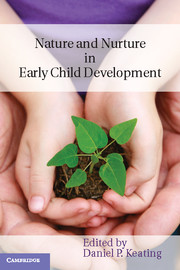Book contents
- Frontmatter
- Contents
- Contributors
- Acknowledgments
- Introduction
- 1 Biological and Experiential Influences on Psychological Development
- 2 Neural Development and Lifelong Plasticity
- 3 Mother and Child: Preparing for a Life
- 4 Early Experience and Stress Regulation in Human Development
- 5 Biology and Context: Symphonic Causation and the Distribution of Childhood Morbidities
- 6 Understanding Within-Family Variability in Children's Responses to Environmental Stress
- 7 Origins, Development, and Prevention of Aggressive Behavior
- 8 Mental Health Intervention in Infancy and Early Childhood
- 9 Bringing a Population Health Perspective to Early Biodevelopment: An Emerging Approach
- 10 Society and Early Child Development: Developmental Health Disparities in the Nature-and-Nurture Paradigm
- Index
- References
10 - Society and Early Child Development: Developmental Health Disparities in the Nature-and-Nurture Paradigm
Published online by Cambridge University Press: 03 May 2011
- Frontmatter
- Contents
- Contributors
- Acknowledgments
- Introduction
- 1 Biological and Experiential Influences on Psychological Development
- 2 Neural Development and Lifelong Plasticity
- 3 Mother and Child: Preparing for a Life
- 4 Early Experience and Stress Regulation in Human Development
- 5 Biology and Context: Symphonic Causation and the Distribution of Childhood Morbidities
- 6 Understanding Within-Family Variability in Children's Responses to Environmental Stress
- 7 Origins, Development, and Prevention of Aggressive Behavior
- 8 Mental Health Intervention in Infancy and Early Childhood
- 9 Bringing a Population Health Perspective to Early Biodevelopment: An Emerging Approach
- 10 Society and Early Child Development: Developmental Health Disparities in the Nature-and-Nurture Paradigm
- Index
- References
Summary
The long-standing nature versus nurture debate has generated many controversies and was in turn fueled by them. The question of whether differences among individuals should be attributed to their genes or their environment, their inheritance or their circumstances, has been – and remains – central to how policy makers and the public alike think about major issues concerning social arrangements. It has become so fundamental to public discourse that it is hard to see beyond this legacy and grasp the full implications of the emerging nature-and-nurture paradigm captured in the preceding chapters of this volume. On the evidence presented in this volume, and continuing to accumulate rapidly in research centers around the world as developmental scientists use new tools and technologies to explore the new paradigm, the impact of this shift in thinking will be profound.
The greatest impact may well be in an area that has always been among the most controversial in the long nature-nurture standoff: What accounts for individual differences in competence and health? There is overwhelming evidence that individual differences in the full range of developmental outcomes – cognitive, behavioral, and social competence, along with physical and mental health, an aggregate for which we have used the term “developmental health” (Keating & Hertzman, 1999) – are not random but rather patterned by socioeconomic circumstances (Keating, 2009b).
- Type
- Chapter
- Information
- Nature and Nurture in Early Child Development , pp. 245 - 292Publisher: Cambridge University PressPrint publication year: 2010
References
- 3
- Cited by

